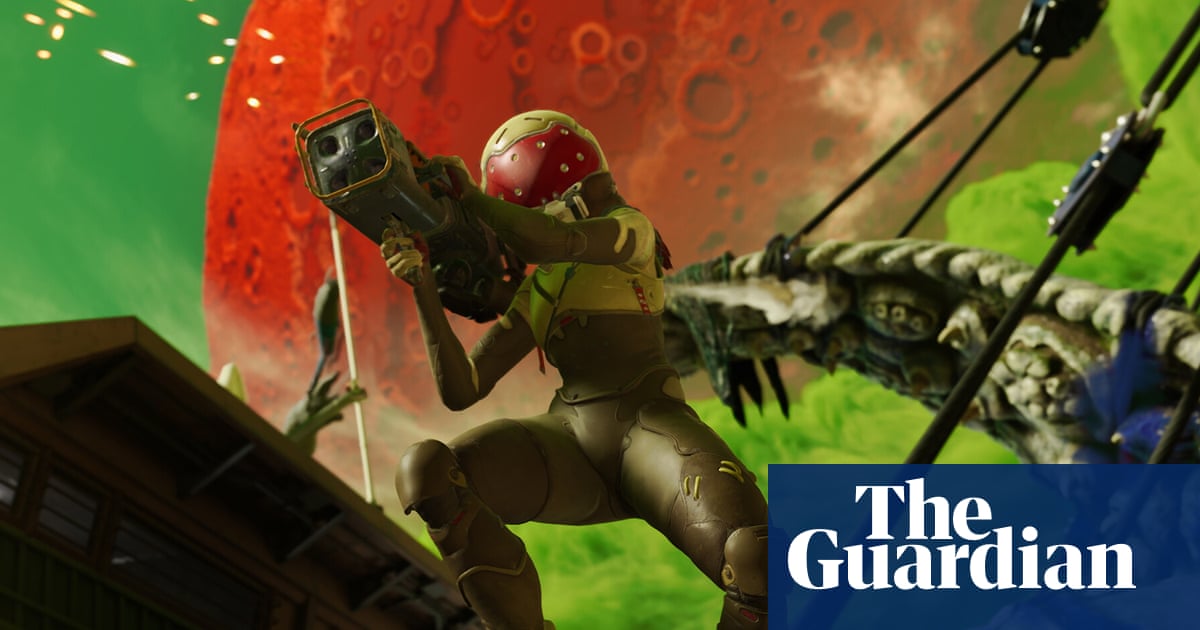It is fair to say that the video game industry is undergoing a period of alarming disarray. Studios are closing, development budgets are exploding and profitable genres are becoming saturated by mega-budget pick-me candidates that feel utterly interchangeable.
Into this troubling market comes Concord, Sony’s new five-v-five “hero” shooter, the subgenre of the multiplayer online blaster where players control characters with elaborate special powers rather than identikit spec-ops soldiers or space marines. Set in a warring galaxy controlled by an autocratic regime known as The Guild, the game gives us control of various Freegunners – mercenaries who plough the space lanes looking for jobs while also slinging one-liners at each other in the game’s highly polished cutscenes. In the game, however, what they do is fight.
All the standard characters of the hero shooter are present – vanilla soldier, floaty witch, teleporting weirdo, sassy tank – yet none have the immediate appeal of Overwatch denizens such as D.Va or Mei. They do, however, bring lots of variety to the combat zone. Lark is a bizarre mushroom alien who plants spores that slow enemies while healing allies; Kyps is a stealthy assassin who can reveal enemy positions to her team; bulky robot 1-Off throws exploding trash cans. I like the innate flexibility of these skills and the way they combine between characters. The submachine-gun-toting Duchess can throw down a defensive barrier, which is useful for cover, but also blocks off objective points from the opposing team, and can also be used to funnel enemy soldiers into ambushes. Daveers can bomb an area with a napalm-like substance named Burnite, which can then be ignited by incendiary fire from other players doubling its effect.
The 12 launch maps are mostly hypercolourful variations on the sci-fi industrial spaces we used to see in Quake. Spine Works and Sorting Hub are labyrinthine complexes, all interconnected steel walkways, shipping containers and box-like warehouse choke points. Water Hazard is an abandoned oil rig with the remains of a giant sea monster lying across the top like some sort of nightmarish Lovecraftian sushi dish. My favourite is Train Trouble, a post-apocalyptic railway graveyard where Mad Max meets Tatooine.
When it comes down to what counts, the moment-to-moment excitement and tension of team-based combat, Concord really flies at times. Movement has that slightly floaty feel of Destiny, which works brilliantly in these extremely vertical maps, encouraging players to make use of double jumps so that fights are truly three dimensional. The gun feel is excellent: from shotguns to laser pistols, every weapon is solid and readable, the audio and visual feedback perfectly conveying its unique capabilities. There are sublime moments, when your whole team is together, and all their abilities are combining and exploding in unpredictable ways, creating a euphoric shooter experience equal to your best times with Overwatch.
But right now, the big question is whether it has enough to tear players away from Activision’s game, or Valorant, or Apex Legends, or any of the others. It is beautifully made, but big parts of it are achingly familiar, not just in terms of character types or the anime-tinged visual aesthetic, but in the structure. The game modes are all the standard types – there is a team death match, there is one where you have to dominate three objective zones, another where there is only one zone but it is always moving, another where you have to pick up tokens from downed enemies to register the kill. This is the stuff we have been playing since Doom. Meanwhile, the dialogue and humour is the same post-Whedon ironic detachment shtick that Marvel and Netflix YA dramas have been force-feeding us for a decade. Oh for the dark, wanton satire and anarchic team-mate-slaughtering mayhem of Helldivers 2.
Concord’s most interesting wrinkle is in the game’s “meta”, the strategic part outside the main action. The game has introduced some deck-building elements, in that you have to assemble your own crew of characters, each with slight variants on the typical abilities. All these characters have unique buffs known as Crew Bonuses that add subtle boosts to your team’s health, armour or firepower whenever you play them in a match; these stack throughout the fight – so if you are playing with an organised team, you can work together to build a formidable statistical advantage, like a good hand in Hearthstone. It is an interesting idea, but in the chaos of public servers, where only a fraction of participants play as part of an organised team, it is hard to know if it will have any effect.
Perhaps the bravest element of Concord is that it is a premium-priced product, rather than a “live service” free-to-play release – so instead of the ubiquitous season pass model, any subsequent content will be free. It is also unapologetically and loudly diverse, which will upset the sorts of players who modern online games should be upsetting because, frankly, this minority of misanthropic gatekeeping blowhards is ruining the fun for everyone else.
Ultimately, Concord needs time, space and a healthy community if it is to soar above its older, wiser competitors. Right now, with players getting the feel of the place, it is skittish and unfocused – but also, occasionally, amazing fun. With its attitude, its detail, its elaborate backstory (explorable through a visual encyclopedia surely inspired by The Hitchhiker’s Guide to the Galaxy) it feels like something the development team truly cherishes. Assuming the life support of publisher funding isn’t ripped out too soon, there’s a chance it will find an audience that feels the same.

